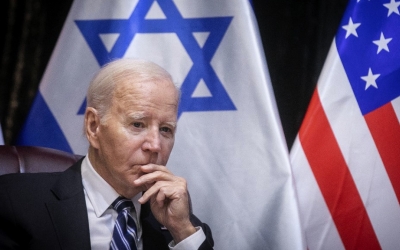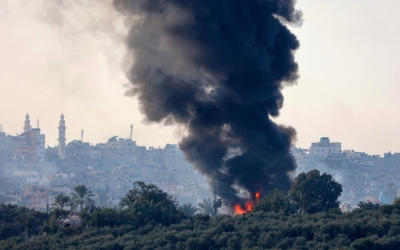War on Gaza: Jordan in hot water after report it's helping Israel break Red Sea blockade

Reports that the United Arab Emirates (UAE) is transporting goods to Israel via Jordan, on a new land route bypassing the risk of attacks on shipping in the Red Sea, off Yemen, has stoked anger on the Jordanian street.
Hundreds of Jordanians have held protests demanding an end to what they called "the Zionist land bridge" aimed at circumventing the impact of the attacks on ships heading to Israeli ports by the Iran-aligned Ansar Allah, better known as the Houthi movement.
In mid-December, Israeli media reported the arrival of the first batch of commercial shipments of fresh produce to Israel from the UAE through a new alternative route that passes through Saudi Arabia and Jordan and takes two days.
The Jordanian government has since repeatedly attempted to dispel the reports as misinformation, however a recent report by Israeli Channel 13 caused widespread anger in Jordan.
On 31 January, the channel broadcast interviews with truck drivers coming from the UAE carrying goods for Israel and drone footage of dozens of commercial trucks parked at the border crossing that connects Jordan to Israel in the Jordan Valley region.
Stay informed with MEE's newsletters
Sign up to get the latest alerts, insights and analysis, starting with Turkey Unpacked
Since 19 November, the Houthi movement, which controls major parts of Yemen, has launched a series of exploding drones and missiles at commercial vessels in the Red Sea, one of the world's most major shipping routes, in what they say is a response to Israel's military campaign in Gaza.
Since the attacks started, Israel's only Red Sea port at Eilat, has seen an 85 percent drop in shipping activity, its chief executive said in December.
Break the siege
At a protest on Saturday evening, near the University of Jordan, dozens of students formed a human chain and held signs denouncing the trucks that are carrying goods "in the era of massacres", and the inaction of Arab states to break the siege on Gaza, where the population are facing catastrophic hunger.
"We stand today to block the land route that saves the Zionist enemy from the resistance’s siege in the Red Sea, which has returned to Arab sovereignty by Arab hands," Hamzah Khader, a member of the Boycott Divestment and Sanctions (BDS) movement in Jordan, told Middle East Eye.
"We demand that Jordanian vegetable merchants be prevented from exporting vegetables to Israel to save its economy that has been destroyed by the resistance and the steadfastness of the people in Gaza."
Protests were also held on Friday, with hundreds of people taking part in a march in downtown Amman and in other cities such as Irbid, Aqaba, Karak, and Zarqa.
In their chants, the protesters called on the Jordanian government to sever relations with Israel, cancel gas agreements, and prevent the crossing of any truck coming from the Gulf states to Israel.
Jordanians also launched an online campaign under the Arabic hashtag Jordanian Land Bridge to Gaza, calling on the government to send humanitarian aid to the besieged enclave.
Khaled Al-Juhani, director of the office of the parliamentary Reform Bloc, affiliated with the Islamic Action Front party, said the bloc has asked the government about the land bridge, the number of trucks that have passed from Jordan to Israel since the start of the war on Gaza on 7 October, and the value of the country's exports to Israel.
'We demand that Jordanian vegetable merchants be prevented from exporting vegetables to Israel to save its economy'
- Hamzah Khader, BDS member
Juhani said Prime Minister Bisher Khasawneh, in discussion with Reform Bloc representatives, did not explicitly deny the existence of a land bridge, saying a route from Arab states to Israel has been present long before 7 October.
"This goes against the protesters' demands that call for breaking the siege on Gaza, not on Israel," Juhani said.
More than 27,300 Palestinians have been killed and over 66,600 have been wounded in Gaza since Israel launched a relentless bombing campaign and ground invasion of the Strip on 7 October.
Jordanian denial
During a cabinet session, the prime minister strongly denied the reports of UAE shipments passing through his country as lies.
"We have heard and are hearing many distortion, misinformation, and lies about activities taking place in Jordan and across Jordan that would provide a cover or support for the continuation of the killing machine that we are working diligently and seriously to stop," he said.
Jordan's official news agency Petra has quoted sources in the transport ministry, and the industry and trade ministry as also denying the reports.
Follow Middle East Eye's live coverage of the Israel-Palestine war
"The news being circulated attributed to Hebrew media and social media about the existence of an alternative land bridge to the Red Sea, through Dubai ports, passing through Saudi Arabia and Jordan, to transport goods to Israel is completely untrue," one source said.
Meanwhile, the head of the Jordanian Truck Owners Syndicate, Mohammad al-Dawad, accused Israel of broadcasting propaganda to undermine "the strong", official and popular Jordanian position in support of Gaza.
"We will not be a carrier for Israel in any way. All truck drivers are with the Palestinian cause and in one trench with the people of the West Bank and Gaza, and we will not support the occupation by helping Israel," Dawad told MEE.
However, pictures published on Israeli social media purportedly showed vegetables of Jordanian origin in Israeli markets, bearing stickers of a Jordanian company located in the capital Amman and the Jordan Valley border region.
Middle East Eye tried to contact the party whose name appears on the stickers but received no answer.
"Those who export to the occupiers are brokers who have nothing to do with the association, which rejects this matter," the head of the Union Cooperative Society for Jordanian Agricultural Products Exporters, Suleiman al-Hiyari, told MEE.
"These are intermediaries who buy farmers’ goods from the market, and the farmer does not know where this intermediary sells it later."
Agriculture minister Khaled Hanifat meanwhile attacked Jordan's vegetable merchants who export their products to Israel, saying, "there is no legal mechanism that prevents vegetable merchants from exporting to Israel, but we tell them, 'under these circumstances, shame on you'."
The Jordanian Ministry of Agriculture announced that Jordan's total exports of vegetables to Israel amount to 1,300 tonnes per month out of a total of 12,500 tonnes of its vegetable exports.
Middle East Eye contacted Jordanian government spokesperson Muhannad al-Mubaidin for comment but did not receive a response by the time of publication.
This article is available in French on Middle East Eye French edition.
Middle East Eye delivers independent and unrivalled coverage and analysis of the Middle East, North Africa and beyond. To learn more about republishing this content and the associated fees, please fill out this form. More about MEE can be found here.






